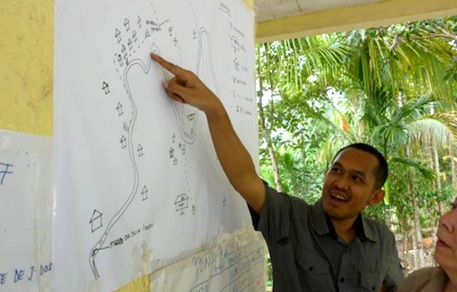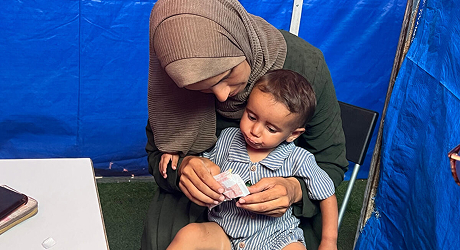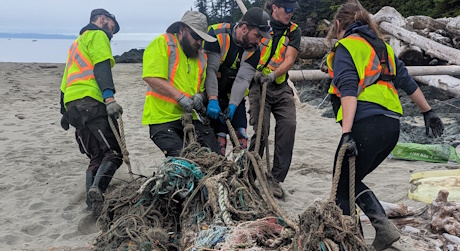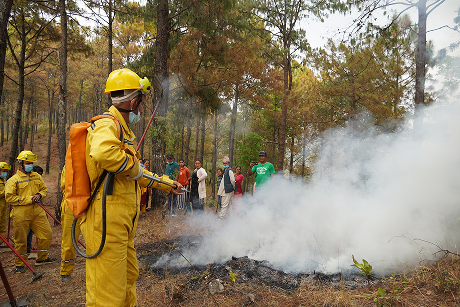Footprints Project
Since 2005, travelers like you have helped us change the world through micro-donations.

-
A total of
11831
Travelers
-
donated
$26969.31
(100% funded) -
to help improve
Water & Sanitation
-
impacting
2539
people -
in
Timor-Leste
This project has met its aim to enhance the health and quality of life of approximately 160 poor people in one village in Manufahi district through the delivery of safe water, sanitation and hygiene.
Objective 1 – Help all community members to gain access to a supply of safe, sustainable water.
Although Maurem village had access to plenty of nearby water sources, none of these were protected and therefore drinking water was prone to microbial contamination from human and animal faecal matter. Thanks to the support of the Footprints Network partners, we were able to:
- Construct a water supply system that protects the natural spring water source from contamination and delivers water close to people’s houses using gravity-fed water that runs from a clean source in the hills via buried pipes.
- Build nine community tap stands to service 24 households and one primary school. The tap stands include drainage to reduce water pooling and mosquito breeding, and ramps, to make them more accessible to people with limited mobility e.g. older people.
- Establish a community water and sanitation committee to oversee the upkeep of the project. This group will collect a small fee from households (US$0.25 per month) to contribute to the ongoing maintenance of the water system (e.g. repairing taps, replacing washers etc). This is an important step towards ensuring that the community can continue to access safe, potable water into the future.
An ongoing challenge facing the community is the lack of nearby shops that retail water supply spare parts. WaterAid will work with small shop owners to establish supply chains in the nearby town, Same.

Photo: Gloria demonstrates how to use her new bamboo hand washing tap. Her little brother also likes to play with the tap (more times a day than is strictly needed!)
Objective 2 – Help all community members to gain access to low-cost, low-maintenance, hygienic latrines through community-led total sanitation approach.
WaterAid’s baseline data showed that prior to this project almost all of Maurem’s 163 villagers practiced open defecation. This practice is a major contributing factor to diarrhoeal disease and under-five mortality.
Only one out of 24 households had access to a basic ‘hanging’ latrine, which was little more than a log platform over an often dry river bed. The primary school also had no latrines for staff and its 38 students to use.
Using a variety of community ‘triggering’ tools WaterAid staff and their local partners motivated community members to construct latrines. In total the community constructed 25 pit latrines from bush materials, one for each household and a ‘community toilet’ to service the school and any visitors.
On 11 September 2012 the community was officially declared Open Defecation Free. This status means that the community is committed to ensuring residents, as well as any visitors, use latrines without exception. Since the project was completed a number of women have taken the initiative to upgrade their pit latrines to concrete pour flush models. This is an excellent indicator to WaterAid that the community both uses and values their latrines.
WaterAid will continue to monitor latrine use every six months over the next two years to identify any slippage in behaviour and evidence of open defecation. WaterAid will also collect information on reduced incidence of diarrhoeal disease.

Photo: Community members learn about faecal–oral transmission through ‘triggering activities’
Objective 3 – Help all community members to improve their hygienic practices and environmental sanitation.
... focusing on hand washing at key times, penning animals and reducing places for mosquitoes to breed.
As part of a hygiene education program, all community members received education on safe hygiene behaviour either directly or indirectly, through other family members. Hygiene sessions were conducted with women and children, using focus group discussion, theatre and games. These sessions focused on reiterating the importance of hand washing at critical times (before eating and feeding babies, after using the latrine, after changing babies).
As a result of this campaign, members of every house built one, and in some cases two, ‘tippy taps’ outside their latrines and kitchens.
Sustaining behaviour change is extremely challenging and requires ongoing support. WaterAid has trained community members as ‘hygiene promotion officers’ to continue to provide information to children and their families about hand washing.

Photo: Maurem children learn about hygiene and hand washing through this moderated snakes and ladders game
Case Study - Safe water and hygiene brings a 'revolutionary' change in Maurem
Mr Egas Monis Tilman, aged 55, is a local Maurem leader and was elected head of the community water and sanitation committee.
He describes the changes in Maurem’s sanitation and hygiene behaviour over the past six months as ‘revolutionary’. He believes that the motivation for this change was information – once the community members came to understand how open defecation and poor hygiene meant they were effectively consuming each other’s faeces (eg through cross contamination by flies and fingers), they became keen to construct latrines immediately.
In 2012, WaterAid began trialling a community satisfaction tool and Maurem is one of the first communities to provide feedback in this way. Men and women ranked different elements of the project out of a best possible 5 including construction quality, WaterAid and partner supervision of construction, level of community participation, access to water, sanitation and hygiene etc. Almost all feedback was between 4–5 marks. Some suggestions for improvement that have been taken on board include for WaterAid to continue hygiene promotion activities in the community and support to transport materials to enable people to upgrade their latrines.
Traveling soon? When you buy travel insurance with us, you can make a contribution towards a cause you care about.
Get a quote






